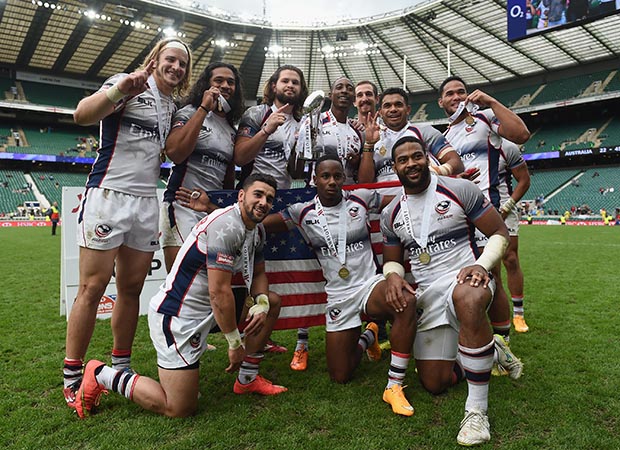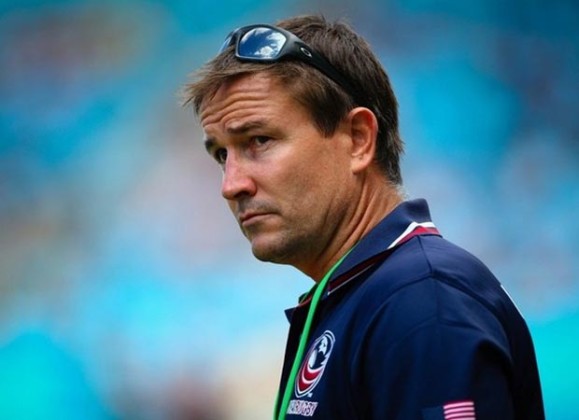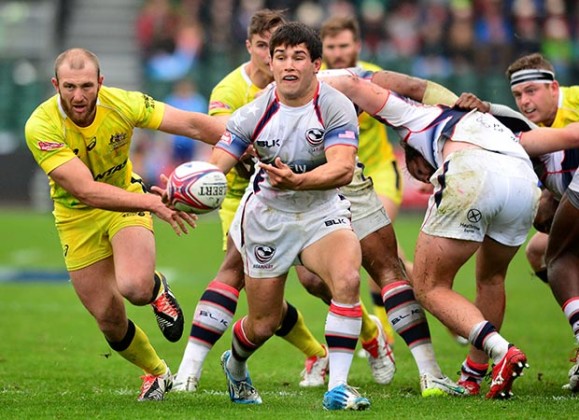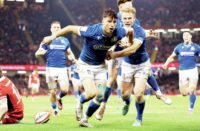 Last Tuesday evening, when Madison Hughes and his American Sevens squad arrived back at the USA Olympic training centre in Chula Vista, near San Diego, it was high fives all the way as they headed to the campus Bar where they placed the cup for their Marriott London Sevens win in the trophy cabinet.
Last Tuesday evening, when Madison Hughes and his American Sevens squad arrived back at the USA Olympic training centre in Chula Vista, near San Diego, it was high fives all the way as they headed to the campus Bar where they placed the cup for their Marriott London Sevens win in the trophy cabinet.
The USA's triumph saw a slight but definite shift of the tectonic plates of world rugby and also suggests they have a decent sporting chance of making it three Olympic rugby titles on the bounce when the sport is re-introduced in Rio next year. They were, of course, Olympic champions in 1920 and 1924.
OK, it was just one tournament win in nine on the HSBC World Series this season and, after finishing sixth overall, the USA have yet to qualify for Rio. But their triumph in London, in its own way, was the most electrifying Sevens I have witnessed since the halcyon days of Jonah Lomu, Christian Cullen and Waisale Serevi at Hong Kong in the Nineties.
The Eagles were quality everywhere you looked and in one afternoon seemed to advance the game five or ten years, or at least show that you don't necessarily need the God-given rugby talents of the Fijians or New Zealand to prosper.
The USA bossed the tournament and produced an athletic, dynamic, brand of Sevens that shook their opponents to the core. On twitter everybody from Sir Clive Woodward and Michael Lynagh downwards were raving about what they were seeing as they moved smoothly through the tournament unbeaten and then, at the business end, crushed England 43-12 in the semi-finals and then dismantled Australia 45-22 in the final itself.
It was quantum leap even from the very much improved version of the Sevens game we have been watching in the last three or four seasons, ever since rugby regained its Olympic status in fact. What a shot in the arm that has been.

The USA Seven have hinted at such potential a number of times this season and the rugby world has waited with a combination of curiosity and fear for the Eagles to take flight. Well, in Sevens at least, that moment has arrived and if they can carry this form into the Olympics the rugby landscape could change dramatically.
Eagles coach Mike Friday – aided and abetted by his old Wasps mucker Phil Greening and Kiwi fitness man Chris Brown – has been planning and plotting for a while. This hasn't happened overnight, although the casual observer at Twickenham, expecting a lazy Sunday afternoon in the sun, seemed to be caught by surprise.
The USA have been putting together a modern tailor-made, bespoke squad to look at Sevens afresh. You need extreme gas so the USA went out and found two players who have so much gas they would make any national 4x100m squad in the world bar Jamaica and USA. And having sourced these guys, the USA use them ruthlessly, playing the game at their pace and in areas of the field where they can smoke any opponent.
Carlin Isles posted a 10.13secs for the 100m when he last ran competitively in 2012 when he was just 22 and the explosive element of his running has almost certainly improved since then. The Detroit Lions, where he spent a month in January 2014, timed him at 4.22secs for 40 yards which is really shifting from a standing start. When he hits the turbo his running style is not dissimilar to that of Jesse Owens. Enough said.
Isles is without question the quickest man ever to play any kind of bone fide international rugby but the most impressive thing about the man from Massillon is how he had morphed into a proper rugby player as well. His inside/outside swerve is the best on the circuit – witness one of his tries against England last week – some of his tries are things of beauty as well as awe. He has also learnt that sometimes, when he is double teamed, it's better to draw the tackles and pass which he does with some panache.
Perry Baker is an even more recent addition, a 10.27 glider, a sumptuous silky smooth sprinter and showman who would probably be a 200m merchant if he had continued with track and field.
Baker, who only came into the squad this season, looks an even more natural rugby player with his balance and positional awareness. Isles (32) and Baker (29) have logged 61 tries between them on the circuit this year and Mike Friday has tended to field only one at a time – which means whichever speedster takes the pitch he is usually well rested.

But the USA are so much more than pure speed. In Madison Hughes – schooled at that great Sevens academy Wellington College in Berkshire where he was a key man in their 2011 Rosslyn Park Sevens winning team – they have a general and tactician as well as a considerable try-scorer and goalkicker in his own right. Folau Niua, who has broken into the Eagles Test XV as well is a clever playmaker while, probably most importantly of all, the Eagles have made restarts their domain.
The high, hanging, short, dropped kicked restart is now the primary source of possession in the Sevens game and the USA have responded best by selecting superb athletes to deal with the challenge rather than the one big forward Sevens team traditionally fielded.
Zack Test, a former wide receiver at the University of Oregon and missing at London through injury, has established himself as he best ‘receiver' in the business and Danny Barrett, an absolute beast of an athlete, isn't far behind. Test, with great pace for a big man, is a prodigious try-scorer while Barrett is a wrecking ball.
“I was blown away by what I saw from the States seven,” says Wales and Lions captain Sam Warburton, no mean Sevens player himself early in his senior career and a guest for the day at Twickenham. “They are picking great all-round athletes with very specific jobs to do and the balance is excellent. I couldn't be more impressed. It feels like they have raised the bar another level.”
If USA were undoubtedly the story of London, the return of Fiji to their very best under coach Ben Ryan dominated the HSBC World Series over the seven months of its duration with four tournament victories. Remarkably it was only Fiji's second World Series title in 16 attempts. Ryan, so popular back in Fiji these days that posters of his ginger countenance dominate billboards in Suva and elsewhere, has imposed organisation, discipline and a real concentration on fitness while in no way compromising their incredible instinctive flair.
That is some trick to pull off and although he, too, will have taken note of what the USA achieved he will be backing his players secure gold in Rio next year, which would be that nation's first ever Olympic medal should it happen.
Their quarter-final against South Africa at Twickenham – Fiji needed to win to take the overall series – was epic in that for the first four minutes solid Fiji did nothing but tackle and keep their discipline in defence. The won the match, there and then, by not succumbing in a manner you don't normally associate with Fiji. Only after they weathered the storm did they rip into South Africa and score three sparkling tries to light up the day.
Fiji boasted a number of stunning players with the stand outs – skipper Osea Kolinisau, Pio Tuwai and the two try machines Savenaca Rawaca and Semi Kunatani and the challenge now will be keeping them all in the Sevens programme as the big clubs circle.
South Africa again came up just short again as runners-up. The Blitzbokke won Dubai and their home tournament early on but, untypically, finished poorly in Glasgow and London. New Zealand were competitive, of course they were, but they will not be happy with third and at times it seemed they were in a holding pattern, waiting for the some of the big names and young tyros to commit to the Olympics.
Expect another level altogether from New Zealand next season throughout the World Series as they head to Rio.
England, under coach Simon Amor, put in a solid season in which the main aim was securing automatic Olympic qualification for GB which they duly achieved on the first day at Twickenham. That was a fine effort given a sluggish middle phase of the season which culminated in a poor Hong Kong which really put them under pressure. But they responded with an exceptionally gutsy tournament win in Japan and a decent showings in Glasgow and London.
Objectively you would have to say that apart from the classy playmaking of Tom Mitchell, who unfortunately broke his leg in the semi-final against USA, and the dangerous running of Marcus Watson they lack a little stardust compared to some.
The debate and haggling will now start in earnest as to which additional players from Scotland and Wales will be brought into the GB squad and where on earth can they get a game in GB colours because they will have to compete as individual nations in next season's World Series.
Scotland, in particular, performed strongly and a couple of their players at least deserve GB consideration, none more so than skipper Colin Gregor.



























